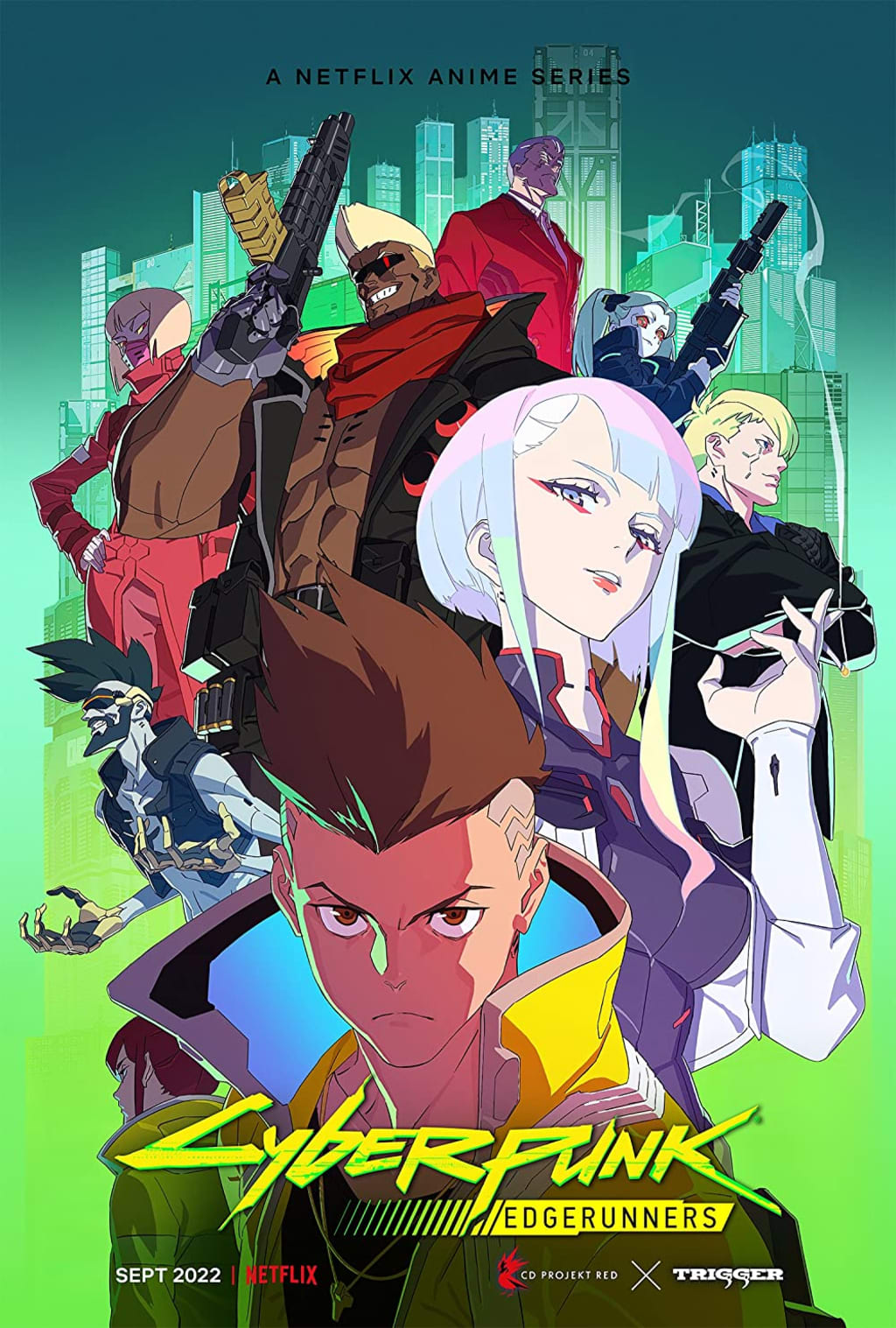Cyberpunk: Edgerunners. A new anime classic is born.
A review of the Netflix miniseries. Director: Hiroyuki Imaishi Length: 1 season of 10 episodes Recommendation: A must watch for tech-anime and cyberpunk fans.

The Cyberpunk: Edgerunners series – a spin-off from the ARPG Cyberpunk 2077 – continues the evolution and elevation of the Cyberpunk genre into mainstream consciousness with an excellent anime production. It is commonly held that making a movie or series based on a video game is a fool’s errand because fans of the video game feel it’s not true to the source, while non-players are often excluded or repelled by the assumed knowledge required. This is where Edgerunners has the advantage; it is not a story based on a video game, but rather a story set in the same world as the video game and an expansion on the genre. As such it is accessible to both ARPG players and non-initiates alike. And for those with a longer memory, you'll recognize elements of the table top RPG as well.
Set in the dystopia of Night City, one year before the events depicted in Cyberpunk 2077, the series follows the story of David Martinez, an Hispanic teenager and resident of Night City, his exit from lawful society and entrance to the criminal world, and his eventual demise.
Early in the story we discover that David attends the prestigious Arasaka Academy, an eponymously named school run by one of the duopolistic corporations that effectively own Night City. The school is a haven for the privileged rich and is both expensive and intolerant. David’s low socioeconomic status makes him a target, despite his academic excellence, and he is regularly bullied. His disadvantage is obvious from the low-quality cybernetic enhancement implants he uses, both hardware and software.
He hates the school and only attends because his mother, Gloria, insists he do so. To pay for his education Gloria works extremely hard as a paramedic, but she also takes advantage of her access to bodies of the immediately deceased. She steals cybernetic hardware from the corpses to sell on the black market – a fact we only discover later and one that has an enormous impact on David’s story.
Together, mother and son are on a treadmill of eerie normality, living mundane lives that teeter on the brink of falling off the precipice of poverty. Their home is a dingy rented unit, with shared pay-per-use laundromat in a squalid part of town. Homeless people line the streets along with piles of garbage. It is clear that this is a dead-end town. Despite the overwhelming obstacles, Gloria is giving her son every possible chance to succeed in life, at least according to the standards of success afforded in Night City.
Inevitably though, Night City’s innate violence rips even this away from them. While Gloria is driving David home from a disciplinary meeting with the school’s principal, their car is caught up in a drive-by shooting. Gloria is severely injured and then dies, but only after a very costly hospitalization.
Gloria’s death is the trigger for David’s descent into the world of crime. Deprived of any sort of income and alone in a world that is thoroughly mercantile, David is quickly forced into no-win choices. While searching through Gloria’s material possessions to find money for her hospital bills and then her cremation, he finds a stolen military-grade cybernetic piece, the Sandivistan. David believes the Sandivistan will give him the advantages he needs to survive and he has it implanted by a ripperdoc, although the ripperdoc advises it may drive David towards cyberpsychosis.
At first David uses the enhanced speed and reflexes for the typical petty acts one might expect of a grieving adolescent; revenge against the school bully, minor self-gratifying crime, and thrill seeking. That is, until he meets Lucy, a netrunner, and through her is inducted into the world of serious crime. She leads him to Maine, a local mercenary gang leader, who accepts David as a new recruit.
The series then plots David’s rise to prominence as a mercenary criminal, inheriting the gang from Maine and leading them on to further success through a mix of courage, intelligence, and genuine care for his fellow gang-members, the latter trait helping to make him a very likable protagonist. This is interwoven with his growing personal relationship with Lucy and general maturation from youth to man. However, despite his growth and successes, there is always a sense of precarious fragility to his existence and a feeling that his downfall is inevitable – it is routinely foreshadowed in fact – but the eventual actualization remains a tragedy that you vainly hope will somehow be avoided through some deus ex machina intervention.
The story could easily have fallen into a boring, cliched revenge or action flick with cybernetics tacked on. Instead it takes the story of simple survival in an unforgiving and anti-humane society and elevates it to make a point about human connection. The three writers’ (Bartosz Sztybor, Jan Bartkowicz, Lukasz Ludkowski) previous work focused on video games and have adroitly changed genre here to bring the human element into focus. No doubt the experienced screenwriting of Masahiko Otsuka and Yoshiki Usa was instrumental in this success. Between them, Otsuka and Usa have a host of high profile screen writing credits such as Kill la Kill, Gurren Lagann, SSSS.Dynezenon, and Little Witch Academy, and their skill and nuance are evident throughout the series.
Hiroyuki Imaishi as Director, has orchestrated the work beautifully to weave a complex of interlocking stories. Like a Himitsu Bako puzzle each block intersects with multiple other pieces to develop a fascinating and believable narrative, in the context of the nihilistic world that is Cyberpunk and Night City.
Imaishi is well versed in the mecha genre with credits such as Gurren Lagaan and Promare , however he also directed Kill la Kill which explored the concept of semi-sentient (and very revealing) “super clothing”. In Edgerunners he has enjoyed the freedom to experiment with a synthesis of the two concepts through implanted tech and mechatech that directly enhances the user’s abilities, and the impact that has on the characters. He adeptly blurs the lines between wearable tech, cybernetic enhancement implants, and cybernetic replacement.
His detailing of the human cost of adopting cybernetic implants is addressed in a layered approach and from multiple points of view, including a cleverly implemented first person perspective of cyberpsychotic rage. He frequently uses the descent into cyberpsychosis as the foil and there are at least six scenes centered around these psychotic episodes. These scenes are invariably violent, in fact the entire series contains high impact violence but while it is extreme it is not gratuitous. The violence always serves to advance the story and helps to frame the dystopian nature of Night City.
The series also explores numerous other themes that link back to the central premise of cyberpunk literature: the dangers of unrestrained capitalism, the human need for connection, and ultimately how we are defined as human in the face of cybernetic alteration.
The capitalist free-for-all of Night City has resulted in powerful mega-corporations that own absolutely everything. Even when David appears to be escaping the predestination of corporate servitude – by escaping into the criminal world – it is soon revealed that he is still working for the corporations, just through shady intermediaries. The dystopian outcome of this disempowerment is akin to Orwell’s 1984 or Kubrik’s film adaptation of A Clockwork Orange, in the futility of trying to circumvent the system that so ruthlessly aims to control and dehumanize. The dehumanizing influence of this ultra-capitalism is mirrored in the dehumanization of the protagonist – and others – by cybernetic alteration.
Offsetting these dehumanizing influences are the very real and tangible relationships the characters form, almost in defiance of the corporatized fascism (or if you cringe from that term, then capitalist neo-feudalism). Lucy, in particular, provides David and viewers with a guiding star of hope. Although she starts as a neo-noir femme fatale, she progresses into arguably the most moral and compassionate person in David’s life. In doing so she passes through a redemptive arc that had me hoping she would somehow provide the necessary god-like intervention to save David.
It would have been interesting to devote more time to Lucy’s story, and the other supporting characters, however the rapid tempo of the story and the density of concepts included did not allow for it. With only 10 episodes it all moves at a break-neck speed. Where they have briefly touched on the provenance or external lives of characters it was done with subtlety and cinematic brilliance. Most notably, the metaphorical representation of Maine’s youth was shown with economy but such poignancy that it was genuinely saddening to think of that lost young man. And you could see he was lost, in every sense of the word.
There is so much to like about this piece of work. The use of mundane repetition, of simple yet powerful symbolism, and the representations of different facets of reality, from the city to the Netscape, have all combined to create a rich narrative world. The characters are well formed and believable despite being extreme in nature. And David remains a truly likable protagonist right up to the end when his naïve, boyish smile still shines through, and his motivations remain so very human.
I recommend you do not binge this one, instead, with only ten episodes, take the time to savour it and make it last, and really let each episode sink in.
About the Creator
Michael Darvall
Quietly getting on with life and hopefully writing something worth reading occasionally.






Comments
There are no comments for this story
Be the first to respond and start the conversation.